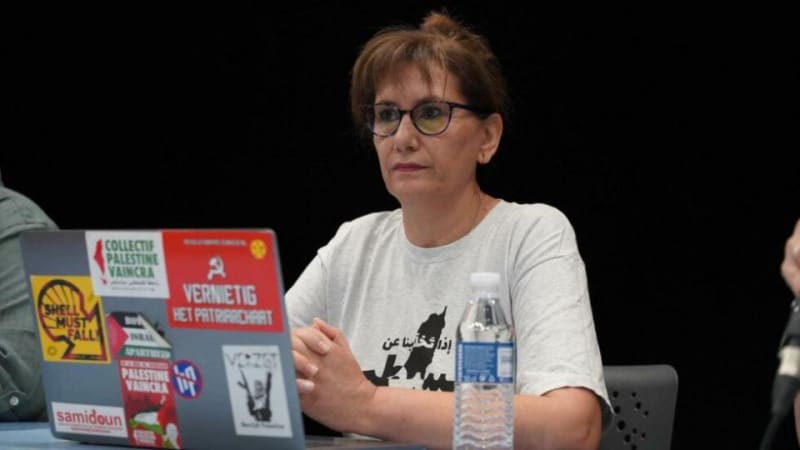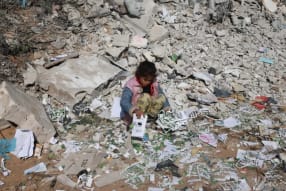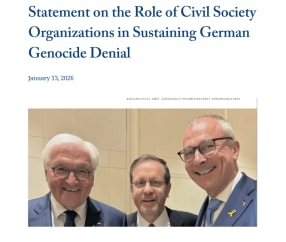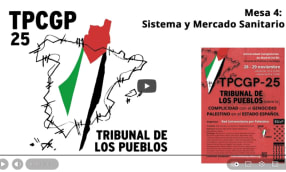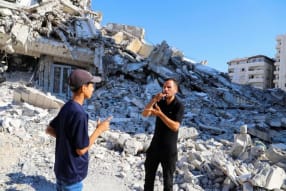ESPAÑOL
«Cambiar a los defensores, no la causa»: Dentro del camino revolucionario de Masar Badil
Entrevista publicada el 6 de agosto de 2025
Fotografía: Jaldía Abubakra participa en un panel en una conferencia de Masar Badil. Su camiseta dice: «Si renunciamos a Palestina, renunciamos a nosotros mismos». (Foto cortesía del Colectivo Masar Badil)
La conciencia política de Jaldía Abubakra se desarrolló a temprana edad. Tenía nueve años cuando su familia se fue de Gaza en 1967, una ruptura que marcaría el resto de su vida. La familia se reubicó en El Cairo, donde, a pesar de estar rodeada de otros árabes, a menudo se sentía fuera de lugar. «¿De dónde soy? ¿A dónde pertenezco?», recuerda haberse preguntado. «¿Por qué me distinguen por mi acento, por el tipo de documentos que llevo?»
A los 18 años, dejó Egipto para trasladarse a Madrid, una decisión que aclararía su sentido de identidad y la llevaría al trabajo político.
“Los palestinos nacen con Palestina como causa”, declaró Abubakra a The Public Source. “Cuando llegué aquí, mi lucha era educar a la gente sobre Palestina y mostrarles que los palestinos tienen derecho al retorno y a resistir”.
Miembro de Samidoun , una red internacional de organizadores que trabaja para fomentar la solidaridad con los presos palestinos, Abubakra también forma parte del comité ejecutivo de Masar Badil, el Movimiento Ruta Revolucionaria Alternativa Palestina. El colectivo se lanzó simultáneamente en Beirut, Madrid y São Paulo en octubre de 2021, durante un período de creciente solidaridad internacional provocado por la pandemia de COVID-19.
Hasta entonces, dijo Abubakra, la organización en Palestina estaba muy localizada. «La pandemia nos obligó a buscar diferentes maneras de comunicarnos con el mundo y entre nosotros», explicó. «Reunió a activistas que hacían lo mismo en diferentes lugares».
El colectivo nació de estas conexiones, comenzando con debates semanales en línea organizados por Samidoun. «Debatíamos, hablábamos, reflexionábamos, y al final de cada sesión, nos quedábamos con la misma pregunta: La situación es mala, pero ¿qué hacemos?».
Un punto de inflexión se produjo en 2020, cuando Abubakra habló con Khaled Barakat, organizador político y cofundador de Samidoun. El gobierno estadounidense había designado recientemente a la red de solidaridad con los presos como organización terrorista; Barakat fue designado personalmente como terrorista. Durante su conversación, Barakat señaló que 2021 marcaría el 30º aniversario de la Conferencia de Madrid, precursora de los Acuerdos de Oslo de 1991.
«Vives en Madrid», le dijo a Abubakra. «¿Qué te parece organizar una conferencia alternativa el mismo aniversario? Tenemos un año para prepararnos».
A Abubakra le encantó la idea. Inmediatamente empezó a buscar un espacio en Madrid, contactando con aliados y organizando reuniones con colectivos afines, entre ellos Samidoun, el Movimiento de Mujeres Palestinas Alkarama, y el Movimiento de la Juventud Palestina Al-Yudur .
Hablamos con Abubakra sobre su papel en Masar Badil, la visión del colectivo de una Palestina liberada y los cambios en la opinión pública sobre el sionismo.
Esta entrevista se realizó en dos sesiones en 2024 y 2025, y ha sido editada para mayor brevedad y claridad.
¿Cómo se fundó Masar Badil y cuáles son sus objetivos centrales en la diáspora?
Los objetivos de la lucha palestina son complejos porque no luchamos contra un enemigo pequeño y local. Luchamos contra un enemigo respaldado por el imperialismo y el capitalismo global.
Aquí en España, nos enfrentamos a la ultraderecha, al gobierno y a las formaciones socialdemócratas que se declaran solidarias con la causa palestina. Somos quienes le decimos «no» a Pedro Sánchez [Presidente español], que no basta con reconocer el Estado palestino; eso es inútil. No vamos a dejarnos engañar en negociaciones, proceso de paz ni mesa de negociación donde algunos hablen en nuestro nombre y nos hagan perder el tiempo como hicieron con Oslo.
El colectivo empezó a crecer a medida que se unían más personas entusiastas. Nos reuníamos semanalmente para debatir los documentos fundacionales de Masar Badil, ya que la conferencia no era el objetivo, sino una etapa de nuestra trayectoria. Redactamos los documentos y, desde el principio, nos aseguramos de traducirlo todo, conscientes de que muchos palestinos en la diáspora no dominan el árabe o no lo hablan en absoluto. No queríamos marginar a la juventud palestina en el extranjero ni dejarla fuera del proceso. Todo lo que surgía del comité de planificación se traducía, y nuestras reuniones más amplias se interpretaban simultáneamente al inglés, español y, en ocasiones, al francés y al alemán. La idea era que este es un movimiento palestino, árabe e internacionalista.
Nosotros, palestinos en la diáspora, queremos ser parte de la lucha del pueblo palestino, para recuperar nuestra voz, tras haber sido marginados por Oslo. Queremos recuperar nuestra voz sin perder el contacto con quienes están dentro. No somos un organismo ni una entidad separada. Somos parte del pueblo palestino y aportamos nuestro conocimiento del mundo exterior —de la política de los países y sociedades en que vivimos— y podemos usar esa ventaja para influir en las políticas de estos países. También tenemos libertad de movimiento; podemos viajar, especialmente quienes estamos en Occidente, y podemos expresar nuestras opiniones con mayor libertad que la gente de algunos países árabes.
España está relativamente cerca de muchas personas que querían participar en la conferencia, aunque es más difícil para quienes viven en Palestina y Líbano. Por ello, celebramos la reunión principal en Madrid, con eventos paralelos en Beirut y São Paulo.
¿Qué distingue a Masar Badil de otras organizaciones palestinas que operan hoy en día?
Nuestra declaración y llamado a la acción comienzan con una cita de Ghassan Kanafani: “Si fracasamos en la defensa de la causa, entonces es mejor para nosotros cambiar a los defensores y no cambiar la causa”.
La postura política de Masar Badil, adoptada en su primera conferencia en Madrid y descrita en la Declaración de Madrid , comienza con una enérgica condena del proceso de negociación con la entidad sionista, iniciado 30 años antes en la misma ciudad. Para nosotros, los Acuerdos de Oslo no solo resultaron un rotundo fracaso, sino que llevaron al pueblo palestino por una senda de devastación, lo que resultó en beneficios netos para la entidad sionista y le permitió alcanzar importantes logros estratégicos.
Nosotros, palestinos en la diáspora, queremos ser parte de la lucha del pueblo palestino para recuperar nuestra voz, tras haber sido marginados por Oslo. No somos un organismo ni una entidad independiente. Somos parte del pueblo palestino y aportamos nuestro conocimiento del mundo exterior.
Más que una organización burocrática o basada en membresía, Masar Badil es un colectivo de activistas y grupos activistas que trabajan por la liberación de toda la Palestina histórica y el reconocimiento del derecho al retorno de todos los palestinos en el exilio.
Un objetivo fundamental de Masar Badil también ha sido incluir a las mujeres en el proceso, no como símbolos ni cuotas, sino como líderes. Lo logramos. También priorizamos la inclusión de la juventud. Si observamos la mayoría de los partidos y facciones palestinos, veremos que sus líderes tienen al menos sesenta años. Sin embargo, Palestina está llena de jóvenes —más del 50 % de la población tiene menos de 35 años— y no tienen voz. Queríamos que lideraran el movimiento y ocuparan el papel que merecen. Son nuestro futuro.
La gente ve que somos serios y que trabajamos sobre el terreno; no solo escribimos manifiestos. Ahora nos prestan atención.
"Cambiar a los defensores, no la causa»: Dentro del camino revolucionario de Masar Badil
Transmitimos la resistencia palestina a todos. Las charlas y mesas redondas que organizamos con miembros de la resistencia —no solo palestinos, sino también otros árabes— llevan estos puntos de vista a Occidente.
El mundo escucha a los analistas europeos. Cuando se incluye a los palestinos en la conversación, suele ser alguien de la Autoridad Palestina (AP). Los izquierdistas occidentales pueden hablar con alguien del Frente Popular para la Liberación de Palestina (FPLP), pero nadie escucha ni dialoga con la resistencia sobre el terreno. Nosotros construimos ese puente entre la resistencia y el mundo. Los medios de comunicación los llamarán terroristas, mientras que nosotros los presentamos como lo que son. Si organizamos una charla con un representante de Hamás, la Yihad Islámica, Hezbolá o Ansar Allah, asisten activistas locales, españoles, alemanes, franceses e ingleses. Es una oportunidad excepcional para escuchar una perspectiva ignorada, una oportunidad para hacer preguntas y recibir respuestas.
La liberación no es el destino final. Tenemos que empezar a construir ahora. No podemos darnos el lujo de esperar a que Palestina sea libre para empezar a construir nuestro Estado.
Por resistencias internacionales, nos referimos a antiimperialistas de todo el mundo. Por ejemplo, estamos en contacto con movimientos de Abya Yala [una palabra indígena que designa las Américas] en Filipinas, con la lucha negra en Estados Unidos y con movimientos indígenas en Canadá. También conectamos con la lucha feminista; la lucha de la mujer palestina no es como la de la mujer europea. La nuestra es una lucha anticolonial, una lucha por la liberación nacional.
¿Cómo imagina Masar Badil la Palestina después de la liberación? ¿Qué tipo de sociedad está construyendo y cómo comienza ese trabajo hoy?
La liberación no es el destino final. Tenemos que empezar a construir ahora. No podemos darnos el lujo de esperar a que Palestina sea libre para empezar a construir nuestro Estado.
Todos deberían leer los documentos de Masar Badil , redactados en 2020 antes de nuestra primera conferencia en 2021. Debatimos estas cuestiones directamente. Desde el principio, nos dijimos: «Pensemos en Palestina después de la liberación».
¿Cómo viviremos, como comunidad nacional, en el «después» con todas estas personas, tanto en casa como en la diáspora, que no hablan el mismo idioma, no comparten la misma cultura y han sido influenciadas por los países y las condiciones en las que crecieron? Un palestino de un campo de refugiados en el Líbano no es lo mismo que un palestino-chileno, pero tendrán que coexistir.
Imaginamos una sociedad laica, democrática, igualitaria e inclusiva. Todos hablan de igualdad de derechos, pero la igualdad de condiciones es fundamental, sin restricciones ni exclusiones basadas en la religión, la etnia, el color de piel, la lengua materna, el sexo o la preferencia sexual. ¿Cómo lo ponemos en práctica? Debemos empezar ahora. Por eso nos organizamos y conectamos entre territorios.
Cuando tenemos una reunión general y palestinos nacidos en Estados Unidos hablan con palestinos nacidos en campos de refugiados en el Líbano, por ejemplo, las contradicciones y las diferencias se hacen evidentes, pero es también ahí donde empiezan a entenderse.
Entendemos que debemos aceptar la soberanía popular; debemos estar dispuestos a aceptar a quien sea que el pueblo palestino elija. Cuando los palestinos eligieron a Hamás en 2006, muchos lo rechazaron. Los palestinos —tanto izquierdistas como liberales de Fatah— no defendieron el resultado, pero deberían haber comprendido que era una falta de respeto no ceder ante la decisión del pueblo.
Debemos aceptar primero la decisión del pueblo, porque él sabe más, y luego trabajar por la Palestina laica e izquierdista que queremos. Esta es también una lección para el resto del mundo árabe: democracia, autodeterminación y soberanía popular.
Es muy fácil imaginar una Palestina sin la Autoridad Palestina. Esta es una figura decorativa con la que solo la ocupación y Occidente colaboran porque sirven a sus intereses. Para los palestinos, tanto dentro de los territorios como en la diáspora, la Autoridad Palestina no significa nada.
Tenemos mucha gente capaz: educada, con experiencia política, con experiencia de lucha y dispuesta a construir un país.
Ha cambiado el genocidio en Gaza el modo en que opera Massar Badil, sus principales prioridades y su cronograma?
No ha cambiado nuestra forma de operar, pero el ritmo se ha acelerado. Nuestra preocupación ha sido Gaza desde el primer día, y hemos trabajado arduamente para situarla en el centro de nuestra labor, visibilizar el genocidio y conseguir apoyo para la resistencia palestina.
Siempre hemos intentado descentrar la narrativa de que «nos están matando» y centrarnos en el hecho de que estamos dando una buena batalla. Debemos valorar la resistencia de nuestro pueblo y de nuestros combatientes en el terreno. El mundo debe ver esa parte, para que no nos vean solo como víctimas, sino como una resistencia digna.
Tenemos que valorar la resistencia de nuestro pueblo y de nuestros combatientes en el terreno.
Nosotros también formamos parte de la resistencia palestina. En Alemania, Samidoun ha sido prohibido, y nuestros compañeros han sido amenazados con la deportación, se les ha revocado el estatus de refugiados, pero lo primero que dicen cuando les preguntamos cómo están es que «nuestra gente está pagando un precio muy alto en la práctica, y nosotros también queremos pagarlo».
En España, sufrimos acoso con demandas, tanto por parte de la policía como de los medios de comunicación. La censura del gobierno español ha aumentado. También podemos vincular esto con la normalización del discurso pro-resistencia, que es uno de nuestros objetivos.
A pesar de esta ola de represión, se han producido algunos cambios en el discurso liberal. ¿Qué opina del reconocimiento oficial del Estado de Palestina y las crecientes críticas a la violencia israelí?
Estos cambios son resultado de la firmeza de la resistencia de Gaza, junto con el frente de apoyo constituido por Hezbolá en el sur del Líbano y Ansar Allah en Yemen. El genocidio ha continuado durante más de un año y medio, pero la resistencia sigue activa. Esto ha obligado a estos gobiernos a responder.
Hoy en día, «Del río al mar» se corea en manifestaciones multitudinarias, a veces de miles, decenas y cientos de miles. Antes, solo pequeños grupos como el nuestro coreaban esta consigna, y se nos tachaba de radicales y extremistas. Las manifestaciones más grandes solían estar llenas de solidaridad humanitaria durante momentos de agresión, pero hoy en día, un mayor número de personas se manifiesta en apoyo a la resistencia y la lucha armada.
El reconocimiento de un Estado palestino es simplemente una forma de apaciguar el sentimiento popular. Esta solución estaba muerta desde su nacimiento, incluso en 1947.
Esa presión ha obligado a algunos gobiernos liberales a cambiar su discurso para ganarse la opinión pública. Por ejemplo, el gobierno español reconoció un Estado palestino y comentó que Israel había cruzado ciertas líneas rojas con su uso excesivo de la violencia. Pero esto es simplemente una forma de apaciguar el sentimiento popular, y siguen defendiendo la solución de dos Estados como la única salida. La solución de dos Estados estaba muerta desde su nacimiento, incluso en 1947, cuando la ONU decidió dividir Palestina. ¿Qué Estado palestino están reconociendo? ¿Dónde y con qué fronteras? Esto es pura mentira.
Dada la postura inflexible de Masar Badil, muchos se preguntan sobre su financiación. Su sitio web afirma explícitamente que no se permite donar a gobiernos, corporaciones ni grandes ONG. ¿Podría darnos información sobre quiénes han donado al movimiento y a qué se destinan estos fondos?
Mi respuesta a esto siempre es: ¿Por qué necesitamos financiación?
Cuando me dijeron que organizara una conferencia en Madrid y que necesitaría un presupuesto de X mil, dije: «Vamos a organizar una conferencia en Madrid gratis». Cada uno cubriría su propio viaje, alojamiento, entradas y comidas. Compañeros y aliados locales nos ayudarían a conseguir una sede, y eso fue exactamente lo que pasó.
El ayuntamiento de Rivas nos cedió el Auditorio Pilar Bardem. Usamos un albergue juvenil para alojar a 20 visitantes que no podían permitirse un hotel. Otros alquilaron casas adosadas en los alrededores de Rivas, donde muchos pudieron alojarse juntos o con compañeros locales. Con las donaciones que Masar Badil recibió de particulares, pudimos pagar dos billetes para refugiados palestinos que tardaron 18 horas en llegar a Madrid.
También recaudamos fondos vendiendo camisetas y keffiyeh. Eso es todo lo que necesitamos. Pagamos la página web y poco más. Cada sección regional de Masar Badil financia sus actividades, como la impresión de panfletos y pancartas para las protestas. Así es como Samidoun y Alkarama también se financian.
A medida que nos acercamos al aniversario del Holocausto y a dos años del genocidio, ¿cómo ha cambiado el trabajo de Masar Badil y cómo se está preparando para lo que se avecina?
Nuestro trabajo continúa con la misma misión: normalizar la resistencia, especialmente en Occidente. Pero, por supuesto, la mayor parte de nuestro esfuerzo se centra en detener el genocidio en Gaza, así como en combatir la represión política que sufrimos, tanto en España como en otros lugares.
Ahora contamos con una sección juvenil internacional de Masar Badil, Tariq el-Tahrir . Es una red juvenil autoorganizada en todo el mundo —en Estados Unidos, Latinoamérica, Europa y el mundo árabe— que opera en coordinación con la población palestina.
Estamos organizando nuestra próxima conferencia anual presencial, prevista para finales de septiembre de 2025, “Apoyando la resistencia en Palestina, Líbano y Yemen”.
Los sionistas intentaron impedir nuestra última conferencia, pero fracasaron. El ministro de Asuntos Exteriores israelí acusó al gobierno español de fomentar el terrorismo al permitirla, pero el ministro español defendió públicamente la decisión de permitirla.
Publicación original en
https://thepublicsource.org/masar-badil-revolutionary-path
ENGLISH
Photo: Jaldía Abubakra speaks on a panel at a Masar Badil conference. Her shirt reads, “If we give up on Palestine, we give up on ourselves.” (Photo courtesy of Masar Badil Collective)
Published on 6 August 2025
Jaldía Abubakra's political consciousness developed at an early age. She was nine years old when her family left Gaza in 1967, a formative rupture that would shape the rest of her life. The family resettled in Cairo, where, despite being surrounded by other Arabs, she often felt out of place. “Where am I from? Where do I belong?” she remembers wondering. “Why do people single me out for my accent, for the kind of documents I carry?”
At 18, she left Egypt for Madrid, a move that would clarify her sense of self and draw her into political work.
“Palestinians are born with Palestine as a cause,” Abubakra told The Public Source. “When I got here, my struggle was educating people on Palestine and showing them that Palestinians have the right to return and the right to resist.”
A member of Samidoun, an international network of organizers working to build solidarity with Palestinian prisoners, Abubakra also sits on the executive committee of Masar Badil, the Palestinian Alternative Revolutionary Path Movement. The collective was launched simultaneously in Beirut, Madrid, and São Paolo in October 2021, during a period of growing transnational solidarity sparked by the COVID-19 pandemic.
Up until then, Abubakra said, Palestine organizing was highly localized. “The pandemic made us look for different ways of communicating with the world and with each other,” she explained. “It brought together activists who were doing the same thing in different places.”
The collective was born out of these connections, beginning with weekly online discussions organized by Samidoun. “We would debate, talk, reflect, and at the end of every session, we were left with the same question: The situation is bad, but what do we do?”
A turning point came in 2020, when Abubakra spoke with Khaled Barakat, a political organizer and co-founder of Samidoun. The US government had recently designated the prisoner solidarity network a terrorist organization; Barakat was personally designated as a terrorist. During their conversation, Barakat noted that 2021 would mark the 30th anniversary of the Madrid Conference, the precursor to the Oslo Accords of 1991.
“You live in Madrid,” he told Abubakra. "What do you think about organizing an alternative conference on the actual anniversary? We have a year to prepare.”
Abubakra loved the idea. She immediately started looking for a venue in Madrid, reaching out to allies, and organizing meetings with like-minded collectives, among them Samidoun, the Alkarama Movement of Palestinian Women, Al-Yudur, and the Palestinian Youth Movement.
We spoke with Abubakra about her role in Masar Badil, the collective’s vision for a liberated Palestine, and the shifting tides of public opinion on Zionism.
This interview was conducted over two sessions in 2024 and 2025, and has been edited for length and clarity.
How was Masar Badil established, and what are its central objectives in the diaspora?
The objectives of the Palestinian struggle are complex because we’re not fighting a small, local enemy. We’re fighting an enemy backed by global imperialism and capitalism.
Here in Spain, we confront the far-right, the government, and social democratic formations that claim to be in solidarity with the Palestinian cause. We're the ones who say “no” to [Spanish PM] Pedro Sánchez, that it’s not enough to recognize the Palestinian state — that’s useless. We're not going to be tricked into negotiations, a peace process, or a negotiating table where some speak in our name and keep wasting our time like they did with Oslo.
The collective started growing as more and more enthusiastic people joined. We met every week to debate the founding documents of Masar Badil because the conference was not the goal — it was a chapter in our journey. We wrote the documents and, from the beginning, made sure to translate everything because we were aware that many Palestinians in the diaspora are not proficient in Arabic or don’t speak it at all. We didn’t want to marginalize Palestinian youth abroad and leave them out of the process. Everything that came out of the planning committee was translated, and our broader meetings were simultaneously interpreted into English, Spanish, and sometimes French and German. The idea was that this is a Palestinian, Arab, and internationalist movement.
We're not going to be tricked into negotiations, a peace process, or a negotiating table where some speak in our name and keep wasting our time like they did with Oslo.
We, Palestinians in the diaspora, want to be part of the struggle of the Palestinian people, to reclaim our voice, after being marginalized by Oslo. We want to reclaim our voice without losing contact with those inside. We are not a separate body or entity. We are part of the Palestinian people, and we bring our knowledge of the outside world — of the politics of the countries and societies we live in — and we can use that advantage to influence politics and policies in these countries. We also have freedom of movement; we can travel, especially those of us in the West, and can express our opinions more freely than people in some Arab countries.
Spain is relatively close to many people who wanted to participate in the conference, though more difficult for those living in Palestine and Lebanon. So we held the main meeting in Madrid, with parallel events in Beirut and São Paulo.
What distinguishes Masar Badil from other Palestinian organizations operating today?
Our statement and call to action begin with a quote by Ghassan Kanafani: “If we are unsuccessful defenders of the cause, then it is better for us to change the defenders and not to change the cause.”
The political position of Masar Badil, adopted at its first conference in Madrid and outlined in the Madrid Declaration, starts with a strong condemnation of the “negotiations process” with the Zionist entity that had started 30 years earlier in the same city. For us, the Oslo Accords not only turned out to be an utter failure but also led the Palestinian people on a path of devastation, resulting in net profit for the Zionist entity and allowing them to achieve major strategic gains.
We, Palestinians in the diaspora, want to be part of the struggle of the Palestinian people, to reclaim our voice, after being marginalized by Oslo. We are not a separate body or entity. We are part of the Palestinian people, and we bring our knowledge of the outside world.
Rather than a bureaucratic or membership-based organization, Masar Badil is a collective of activists and activist groups working towards the liberation of all of historic Palestine and the recognition of the right of return for all Palestinians in exile.
A defining objective of Masar Badil has also been to include women in the process, not as symbols or quotas, but as leaders. We accomplished this. We also prioritized the inclusion of youth. If you look at most Palestinian parties and factions, you see that the leaders are at least in their sixties. Yet Palestine is full of young people — more than 50 percent of the population is under 35 — and they don’t have a voice. We wanted them to lead the movement and occupy the role they deserve. They are our future.
People see that we’re serious and do work on the ground — we don’t just write manifestos. They’re now paying attention to us.
One of your movement's goals is to “link Palestinian and international resisters in the struggle to liberate Palestine and the entire world.” Can you elaborate on what that looks like?
We transmit the Palestinian resistance to everyone. The talks and roundtables we organize with members of the resistance — not just Palestinians, but other Arabs too — bring these viewpoints to the West.
The world listens to European analysts. When Palestinians are brought into the conversation, it’s usually someone from the Palestinian Authority (PA). Leftists in the West might speak to someone from the Popular Front for the Liberation of Palestine (PFLP), but nobody listens to or speaks with the resistance on the ground. We build that bridge between the resistance and the world. The media will speak of them as terrorists, whereas we present them as they are. If we host a talk with a representative of Hamas, Islamic Jihad, Hezbollah, or Ansar Allah, local activists, Spaniards, Germans, French, and English speakers attend. It’s a rare opportunity to listen to an overlooked perspective, an opportunity to ask questions and receive answers.
Liberation is not the final destination. We have to start building now. We don't have the luxury of waiting until Palestine is free to start building our state.
By international resistors, we mean anti-imperialists around the world. For example, we're in contact with movements from Abya Yala [an indigenous word for the Americas] in the Philippines, with Black struggle in the US, and with Indigenous movements in Canada. We also connect with the feminist struggle; the struggle of the Palestinian woman is not like that of the European woman. Ours is an anti-colonial fight, a struggle for national liberation.
How does Masar Badil envision Palestine after liberation? What kind of society are you building toward, and how does that work begin today?
Liberation is not the final destination. We have to start building now. We don't have the luxury of waiting until Palestine is free to start building our state.
Everyone should read Masar Badil’s documents that were drafted in 2020 before our first conference in 2021. We debated these questions directly. From the beginning, we told ourselves: Let's think about Palestine after liberation.
How will we, as a national community, going to live in the ‘after’— with all these people at home and in the diaspora who don't speak the same language, don't share the same culture, and who have been influenced by the countries and conditions that they have grown up in? A Palestinian from a refugee camp in Lebanon is not the same as a Palestinian-Chilean, but they will have to coexist.
We envision a secular, democratic, egalitarian, and inclusive society. Everyone speaks of equal rights, but equality of conditions is critical — without restrictions or exclusions based on religion, ethnicity, skin color, mother tongue, sex, or sexual preference. How do we put this into practice? We must begin now. This is why we are organizing and connecting across territories.
When we have a general meeting and Palestinians born in the US speak with Palestinians born in refugee camps in Lebanon, for example, the contradictions and differences become apparent, but that is also where they start to understand each other.
We understand that we have to accept popular sovereignty; we have to be ready to accept whomever it is that the Palestinian people elect. When Palestinians elected Hamas in 2006, many rejected it. Palestinians — both leftists and liberals in Fatah — did not defend the result, but they should have understood that it was disrespectful not to concede to the people’s choice.
We have to accept the people's choice first, because the people know best, and then work towards the secular and leftist Palestine that we want. This is also a lesson for the rest of the Arab world. That is democracy, self-determination, and popular sovereignty.
It’s very easy to imagine a Palestine without the PA. The PA is a figurehead that only the occupation and the West work with because they serve their interests. For Palestinians, either inside the territories or in the diaspora, the PA means nothing.
We have many capable people: educated, with political experience, experience in the struggle, and ready to build a country.
Has the genocide in Gaza changed the way Massar Badil operates, its main priorities, and its timeline?
It hasn’t changed the way we operate, but the pace has accelerated. Our preoccupation has been with Gaza from day one, and we have worked hard to place Gaza at the center of our work, to make the genocide visible and rally support for the Palestinian resistance.
We have always tried to decenter the narrative that "they’re killing us," and focus on the fact that we’re putting up a good fight. We have to valorize the resistance of our people and our combatants on the ground. The world must see that part, so that they do not see us just as victims, but as a dignified resistance.
We have to valorize the resistance of our people and our combatants on the ground.
We are part of the Palestinian resistance, too. In Germany, Samidoun has been banned, and our comrades have been threatened with deportation, their refugee statuses have been revoked, but the first thing they say when we ask how they're doing is that “our people are paying a very high price on the ground, and we want to pay one, too.”
In Spain, we are being harassed with lawsuits, by the police, and in the media. Censorship by the Spanish government has increased. We can also link this to the normalization of pro-resistance discourse, which is one of our goals.
Despite this wave of repression, there have been some shifts in liberal discourse. What do you make of official recognitions of the state of Palestine and growing criticisms of Israeli violence?
These shifts are the result of the steadfastness of Gaza’s resistance, alongside the support front constituted by Hezbollah in South Lebanon and Ansar Allah in Yemen. The genocide has continued for over a year and a half now, yet the resistance remains active. That has forced these governments to respond.
Today, “from the river to the sea” is chanted in mass demonstrations, sometimes numbering in the thousands or tens and hundreds of thousands. In the past, it was just small groups like ours chanting this slogan, and we were labeled as radicals and extremists. Larger demonstrations used to be filled with humanitarian sympathy during moments of aggression, but these days, greater numbers are coming out in support of the resistance and armed struggle.
The recognition of a Palestinian state is merely a form of appeasement of popular sentiment as they continue to uphold the two-state solution as the only way forward. The two-state solution was dead upon arrival — even in 1947.
That pressure has forced some liberal governments to change their discourse to win popular opinion. For example, the Spanish government recognized a Palestinian state and commented that Israel has crossed some red lines with its use of excessive violence. But this is merely a form of appeasement of popular sentiment, and they continue to uphold the two-state solution as the only way forward. The two-state solution was dead upon arrival, even in 1947 when the UN decided to partition Palestine. What Palestinian state are they even recognizing? Where and over which borders? This is just deception.
Given Masar Badil's uncompromising stance, many wonder about its funding. Your website explicitly states that no governments, corporations, or large NGOs are allowed to donate. Could you give us some insight into who has donated to the movement and what these funds are used for?
My answer to this is always: Why do we need funding?
When they told me to plan a conference in Madrid and that I would need a budget of X thousand, I said, “We're going to host a conference in Madrid for free.” Everyone would cover their own travel, lodging, ticket, and meals. Local comrades and allies will help us get a venue, and that's exactly what happened.
The municipality of Rivas let us use the Pilar Bardem Auditorium. We used a youth hostel to host 20 visitors who couldn't afford a hotel. Others rented townhouses around Rivas, where many could stay together or with local comrades. With the donations that Masar Badil received from individuals, we were able to pay for the price of two tickets for Palestinian refugees who spent 18 hours getting to Madrid.
We also raise funds through t-shirt and keffiyeh sales. That’s all the funding we need. We pay for the website and little else. Each regional chapter of Masar Badil funds its activities, like printing pamphlets and banners for protests. This is how Samidoun and Alkarama fund themselves as well.
As we approach the anniversary of Al-Aqsa Food and two years of genocide, how has the work of Masar Badil changed, and how are you preparing for what's ahead?
Our work continues with the same mission, which is to normalize the resistance, especially in the West. But, of course, most of our effort is focused on stopping the genocide in Gaza, as well as combating the political crackdown that we face, both in Spain and elsewhere.
We now have an international youth section of Masar Badil, Tariq el-Tahrir. It is a self-organized youth network around the world — in the US, Latin America, Europe, and the Arab world — operating in coordination with people in Palestine.
We're organizing our next annual in-person conference, planned for late September 2025, “Supporting the Resistance in Palestine, Lebanon, and Yemen.”
Zionists tried to prevent our last conference from taking place, but they failed. The Israeli foreign minister accused the Spanish government of fostering terrorism by allowing it, but the Spanish foreign minister publicly defended the decision to let it go ahead.
Julia Choucair Vizoso is an independent knowledge producer, seasonal translator, and contributing editor at The Public Source.
Farah-Silvana Kanaan is a contributing writer and editor at The Public Source.
Tracy J. Jawad is an editorial assistant at The Public Source.
Basyma Saad is a contributing editor at The Public Source.


